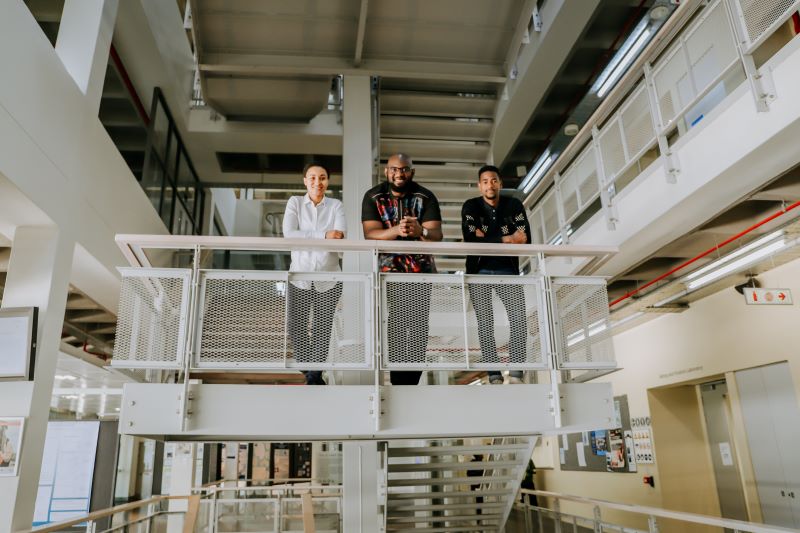Scholarship Supports Scores of Talented Young Engineers

For more than a decade, the Julian Baring Scholarship Fund (JBSF) has been instrumental in retaining young African talent within the University of Cape Town’s (UCT) Faculty of Engineering and the Built Environment (EBE). Since 2010, it has offered generous financial support to 24 postgraduate students, with donations totalling over £300,000 (R6m).

Established in 2000 by UCT alumnus Justin Baring (class of 1994), the fund honours the legacy of his late father, Julian, who was a renowned gold fund manager with a passion for Africa and the mining industry. During his career, he created the James Capel Gold and General Fund, as well as the Mercury World Mining Trust.
“Because he lived in Harare for some time, and we both had a love of Africa, we thought that when he died, we’d set up a foundation in his name to support young previously disadvantaged individuals who want to pursue a career in the mining industry,” explains Baring, who is the JBSF’s co-founder and CEO.
The fund supports university students as well as individuals already working in the mining industry through joint venture agreements with their companies.
“UCT is our flagship partner institution in that we support more students from UCT than any of the other universities we work with,” says Baring. “One of the reasons for this is that the engineering department has exceptionally good candidates and they’re very good at coordinating with us.”
Following in his father’s footsteps, Baring has spent his career immersed in the global natural resources arena and is the founder of an investment partnership (The Red Fort Partnership) which specialises investing in global mining companies.
Despite a busy work schedule, he is personally involved with much of the JBSF’s fundraising, which often takes the form of adventurous activities such as long canoe trips and hiking expeditions.
Making a tangible difference
The JBSF’s relationship with UCT’s EBE Faculty dates back to 2010. Over the past 12 years, it has provided generous financial support to 24 postgraduate students with donations totalling over £300,000 (R6m).

Among these scholarship recipients, three are currently employed by EBE.
Senzo Mgabhi, a scientific officer in the Department of Chemical Engineering’s Crystallization and Precipitation Research Unit (CPU), received comprehensive financial support from the JBSF between 2016 and 2018, while completing his master’s (MSc) degree.
“They covered all my expenses during that period,” he says. “I could buy everything I needed, and it even covered my rent. I really felt very well supported.”
Mgabhi adds that even though his scholarship was initially only supposed to stretch over two years, the JBSF went the extra mile to provide additional funding into a third year when his MSc project assessment was delayed.
Apart from this financial support, being a recipient of the fund has inspired Mgabhi to return to UCT to pursue his academic interests after two years working in the field. This has also enabled him to ‘give back’ by mentoring and assisting MSc students.
Also a CPU member of staff, Lerato Motsepe is a lecturer and researcher whose work focuses on mineral processing- and industrial water treatment projects. Her passion for this field was cultivated during the time she worked at a gold mine.
Motsepe was a JBSF recipient from 2018 to 2020 and says that by providing her with all the essential resources, the scholarship has enabled her to acquire the knowledge and skill to become a proficient engineer in her field.
“Being a part of a scholarship that is passionate about sustainable mining in South Africa makes me proud,” she says.
“Even more so, because I was sponsored for a master’s in chemical engineering, which focused on my passion in industrial water treatment and management. The knowledge that I have gained in this degree has equipped me to become part of the individuals who are striving to turn mining into a greener industry.”
Having recently completed his MSc in Chemical Engineering with support from the JBSF, Archippe Manzila will be graduating at the end of the year and has also been appointed as a senior research assistant in the Hydromet Research Group.
“The scholarship really came at a time I needed it most,” says Manzila. “By funding my MSc for two full years, it allowed ne to focus entirely on my research without worrying too much about other parameters such as finances, especially during the uncertain times caused by the Covid-19 pandemic.”
In his position as a research assistant, Manzila is now able to apply the knowledge he has gained to pursuing his passion for exploring known and new ways to recover metals that are critical for the world economy.
“I am extremely grateful to the Julian Baring Scholarship Fund for their commitment to funding talented young African postgraduate students interested in mining. The scholarship has enabled them to be successful in their studies without the burden of financial stress,” said Professor Alison Lewis, Dean of the Faculty of Engineering & the Built Environment. “Three of the recipients are working as academics in the Department of Chemical Engineering, and we are indebted to the role that JBF has played in securing our next generation of young African academics.”
“Hearing stories of success from our recipients is always heartening because giving these individuals a leg up is really what we set out to do from the start,” says Baring.
Find out more by visiting the Julian Baring Scholarship Fund website.